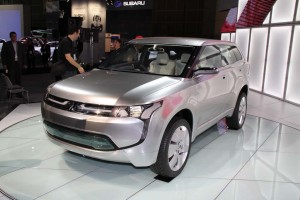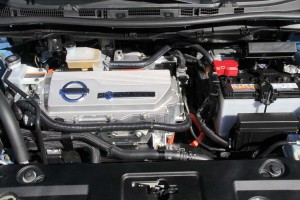
Mitsubishi and Nissan plan to cooperate on conventional vehicles - but may also partner on battery cars like Mitsubishi's iMIEV.
Nissan and Mitsubishi have announced a new joint venture, one that will have the two Japanese makers working together on a new minicar and other products. But the two are apparently looking at other options that could include the joint production of electric vehicles – an emerging market segment where both makers have been staking out an early lead.
Nissan’s tie-up with the smaller, still-struggling Mitsubishi is just the latest partnership engineered by Ghosn, who first went to Tokyo in 1999 to manage an alliance between Nissan and the French automaker, Renault. Since then, Ghosn has pushed the partners into a variety of other alliances and joint ventures, including a far-reaching partnership with Germany’s Daimler AG.
“In the global auto industry, cooperation on specific projects among automakers is becoming increasingly common,” Ghosn said at a Tokyo news conference. ”It is, in fact, a signal of how our industry is evolving to sustain success over the long term, by leveraging size, scale and investments more effectively to create more value.”
The initial focus of the Nissan-Mitsubishi joint venture will be to develop an array of conventionally-powered vehicles, including a Nissan van that will be sold in Japan under the Mitsubishi badge. In turn, the smaller maker will produce an SUV that Nissan can market in the Mideast.
But the most significant effort will be the development of a new minicar. That segment now accounts for a full third of automotive sales in Japan – and is becoming increasingly important in other parts of the world, notably including Europe.
While Ghosn declined to confirm reports that Nissan and Mitsubishi will also work together on a battery car program, he did little to dissuade such talk.
“The alliance of the two automakers seems to be a good one as we can expect more cooperation in electric vehicles going forward.,” the Brazilian-born executive suggested.
The two makers have already been working on a variety of joint product programs, including the Pajero Mini, which is produced by Mitsubishi for Nissan, and the Lancer Cargo, which goes the reverse direction.
But the possibility of having the two companies work together on battery car programs raises some significant opportunities.
Nissan delivered the first of its Leaf battery cars to a U.S. buyer, last weekend, and is looking to ramp up production in the coming months as it stages a staggered global roll-out. By mid-decade, the Japanese maker and its French alliance partner plan to have capacity in place to produce at least 550,000 battery-electric vehicles, or BEVs, annually.
Mitsubishi’s target numbers are lower, but it is nonetheless hoping to establish a significant presence in the battery car market, starting with the launch, next year, of the iMIEV. (For more on the Mitsubishi battery car program, Click Here.)
While collaboration is becoming less unusual in the conventional automotive market, it is becoming quite common in battery-car programs. Toyota, for example, is working with the California-based start-up, Tesla Motors, on a lithium-powered version of the RAV4. Tesla is also working with Daimler AG on battery propulsion systems for its Smart and Mercedes-Benz line-ups.
Ford, meanwhile, has partnered with several outside suppliers, including battery vehicle maker Azure Dynamics, on two of its own products. The first, the Transit Connect Electric, is just going to market, while a battery-powered sedan, the Ford Focus Electric, will launch during the 2012 model-year. (Click Here for more.)

